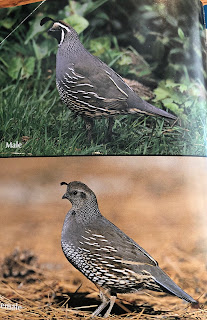What a thrill the first morning that I saw a male and female California Quail in my backyard! The male was perched on top of a pot standing guard while the female ate below. He did hop down and eat a bit himself, but immediately popped back up and continued to scan the surroundings. This went on for 15-20 minutes.
It was the male's striking appearance that first caught my attention. His ten inch length makes him bigger than most garden birds (except my American Crow and Mallard Duck), but his plump body and proudly puffed-out chest make him seem even larger. What is most noticeable is the dramatic black and white coloring on his face, as well as his large black, curled topknot that bobs as he struts. The female (sigh) is a duller version that might almost be mistaken for a pigeon or large dove unless you look closely and see her much smaller topknot.
But together they are a joy to watch as they make their way back and forth, strutting and bobbing, until they suddenly stop and begin what looks like a happy feet dance as they scratch at the ground for seeds or insects. They appear almost daily in the morning and then again before sunset. So far I have seen only the two; whether they have a nest nearby I don't know.
Quail clutches can be large, 12-16 spotted cream-colored eggs, which incubate 18-23 days and are usually hatched by late spring. A second clutch is possible. Come fall and winter, they will gather with other groups and form a covey of 50-100 birds, where together they search for food and warn each other of impending danger. Then in early spring, the covey will disperse as pairs match up and begin to breed once again. While they are monogamous during breeding and rearing season, they are polygamous and will take up with a new mate each spring.
On a humorous note, their most common sound is a three-noted chi-ca-go! It is now so familiar to me that I hear it in the distance at the stables and when I walk my dog around our block. Chi-ca-go! Chi-ca-go! Recently I learned something new that adds a whole new meaning to their call. In Italy, giggling children will ask American tourists if they are from Chicago, then double over with laughter. In Italian, "ci cago" (pronounced "chee-ca-go") means--I poop here!
Further reading:
Birds of Los Angeles Region. Garrett, Dunn, & Morse
Birds of North America, Western Region. Fred Alsop III


No comments:
Post a Comment